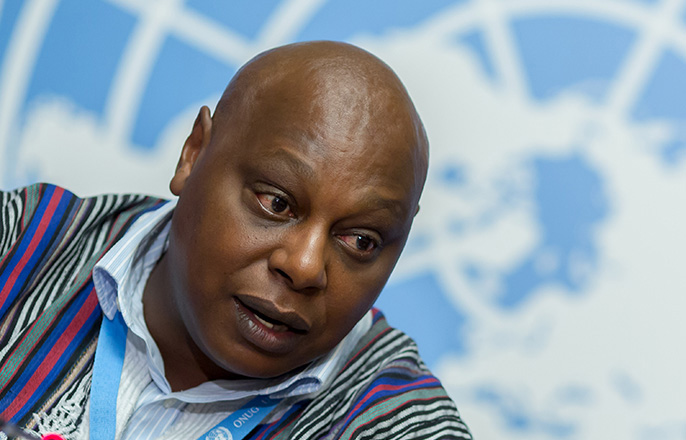UN criticizes Brazil’s anti-terrorism legislation
Rapporteurs warn that the bill approved in the Senate is overly broad and could restrict fundamental freedoms

 Four United Nations special rapporteurs publicly criticized this Wednesday, November 4, the anti-terrorism bill being fast-tracked through the Brazilian Congress. They said the bill has an overly broad definition of terrorism and could restrict fundamental freedoms.
Four United Nations special rapporteurs publicly criticized this Wednesday, November 4, the anti-terrorism bill being fast-tracked through the Brazilian Congress. They said the bill has an overly broad definition of terrorism and could restrict fundamental freedoms.
“We fear that the definition of the crime established by the draft law may result in ambiguities and confusion as to what the State considers a terrorist offence, potentially undermining the exercise of human rights and fundamental freedoms,” said the rapporteurs in a public statement.
Under the false pretense of protecting the nation, Bill 101/2015 could be used to criminalize activists, organizations and social movements that use protests to defend their rights. The bill was approved in the Senate on October 28 and is expected to be voted by the lower house in the next few weeks before being signed into law by the president.
According to Juana Kweitel, program director at Conectas, the statement by the UN rapporteurs expresses the same concerns as Brazilian non-governmental organizations. “When organizations fighting for rights encounter risks in their work, the loser is democracy,” said Kweitel.
In letter of condemnation, more than 80 organizations explained why the legislation will not make Brazil safer, since it does not establish any crime that is not already defined in the country’s Criminal Code.
Click here to read the statement by the rapporteurs:
Brazil anti-terrorism law too broad, UN experts warn
GENEVA (4 November 2015) – Proposed anti-terrorism legislation currently being considered by Brazil’s Congress is too broadly drafted and may unduly restrict fundamental freedoms, warned today a group of UN Special Rapporteurs (*).
“We fear that the definition of the crime established by the draft law may result in ambiguities and confusion as to what the State considers a terrorist offence, potentially undermining the exercise of human rights and fundamental freedoms,” the independent experts said.
Law N° 101/2015 seeks to define crimes of terrorism in Brazil and provides for other investigative and procedural provisions. On 28 October 2015, the Brazilian Senate passed the legislation by 34 votes to 18. The amended text now returns to the lower house.
“We regret that the current draft excluded a previous article establishing an important safeguard that would protect participation in political demonstrations and social movements from falling under the legislation’s scope,” the experts said.
The Special Rapporteurs shared their concerns with the Brazilian authorities, who in turn provided further clarifications on the draft law.
“States have a duty to protect civil society and the rights that are critical to its existence and development, such as the rights to freedom of peaceful assembly and association, and to freedom of expression,” they added.
“Unclear or overly broad definitions of terrorism carry the potential for deliberate misuse of the term,” warned the experts. For that reason, “legislation aimed at countering terrorism must be sufficiently precise to comply with the principle of legality, so as to prevent it from being used to target civil society, silence human rights defenders, bloggers and journalists, and criminalize peaceful activities in defence of minority, religious, labour and political rights,” they noted.
The experts stressed that where security-focused legislation can have an impact on fundamental freedoms, States should always ensure that the principles of necessity, proportionality and non-discrimination are fully respected.
“Counter-terrorism measures that have a negative impact on the ability of NGOs to operate effectively and independently are bound to be ultimately counterproductive in reducing the threat posed by terrorism,” the experts noted.
The bill in question was transferred to the Senate on 19 August 2015, after being approved by the Chamber of Deputies and was considered through an urgent procedure.
The experts concluded that “public consultation in the lawmaking process is indeed an indispensable element in developing policies and in the preparation of legislation.”
(*) The experts:
Ben Emmerson, Special Rapporteur on the protection and promotion of human rights and fundamental freedoms while countering terrorism;
http://www.ohchr.org/EN/Issues/Terrorism/Pages/SRTerrorismIndex.aspx
David Kaye, Special Rapporteur on the promotion and protection of the right to freedom of opinion and expression;
http://www.ohchr.org/EN/Issues/FreedomOpinion/Pages/OpinionIndex.aspx
Maina Kiai, Special Rapporteur on the rights to freedom of peaceful assembly and of association; http://www.ohchr.org/EN/Issues/AssemblyAssociation/Pages/SRFreedomAssemblyAssociationIndex.aspx
Michel Forst, Special Rapporteur on the situation of human rights defenders;
http://www.ohchr.org/EN/Issues/SRHRDefenders/Pages/SRHRDefendersIndex.aspx


